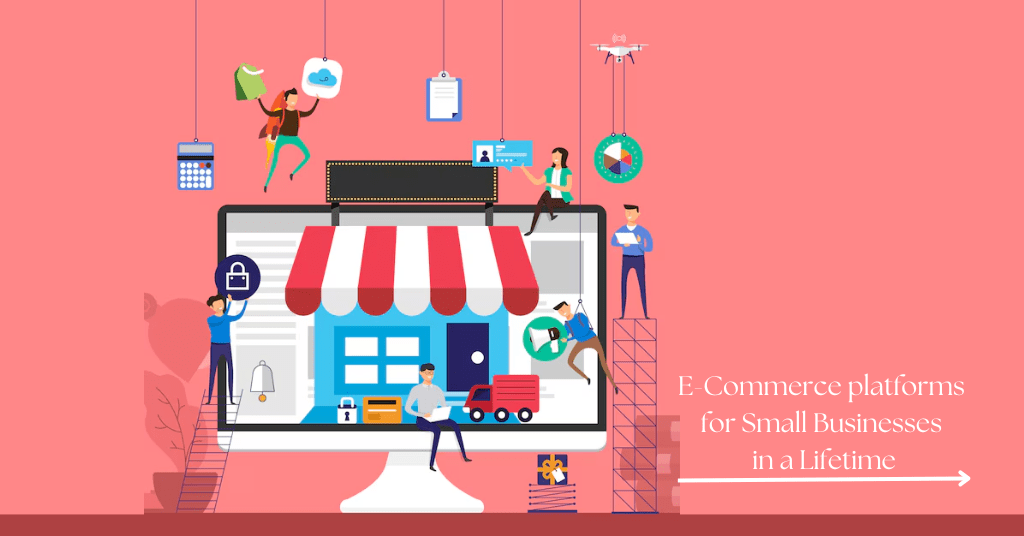12 Best E-Commerce platforms for Small Businesses in a Lifetime – An E-Commerce platform would be an excellent way for a small business to reach several more customers and thus increase its sales. However, identifying the best e-commerce solution can be very daunting since every e-commerce solution is customized with different types of unique features, pricing, and levels of customization.
In this guide, I would rather explore some of the best e-commerce platforms for small businesses by discussing the friendly prices to their budget, the most useable features, and scalability that can handle growth over time.
12 Best E-Commerce platforms for Small Businesses in a Lifetime –

E-Commerce platforms for Small Businesses in a Lifetime
BigCommerce –
While all peers equalize in offering scalable solutions and complete sets of robust tools for ready-to-grow businesses, BigCommerce stands out for its advanced SEO tools, multiple payment gateway integrations, and templates for customization of appearance, developed with no transaction fees to support growth without hidden costs – ideal for growing small businesses that can predict an expansion in product lines.
Wix –
Wix is one of the popular website builders that have an e-commerce component. Very easy to use, with a drag-and-drop editor perfect for novices, the application will allow small businesses to establish a professional online store without technical knowledge within a very short time with multiple templates and custom features.
Weebly –
Weebly is one of the simplest platforms that can be used for small businesses on a tight budget. Built-in e-commerce features make adding products, managing the inventory, and processing orders ease for entrepreneurs. Besides this, Weebly may be budget-friendly because its plans will suit the different requirements of small businesses while keeping the professional quality intact.
Shift4Shop –
Shift4Shop was formerly known as 3dcart. The solution has strong customization options and multiple tools to enrich the experience for customers. This application is perfect for small businesses that feature features including SEO capabilities along with integration with Email Marketing and a variety of payment options. Its reputation lies in flexibility since it is suitable for the business that wants to have complete control over its design and does not intend to seek professional assistance.
GoDaddy –
GoDaddy e-commerce is excellent for simple, one-stop solutions to the masses. The inbuilt marketing tools allow small business owners to sell their wares successfully. Fast loading and great reliability ensure that the customers get through their orders without any problems.
WooCommerce –
As a WordPress plugin, WooCommerce is the customizable open-source platform suited for small businesses running on WordPress. Its ability to offer countless plugins and themes allows for flexibility in terms of enhancing performance in stores and is particularly favorite amongst those who are already familiar with WordPress and want to have full control over their online store.
Squarespace –
One feature that describes Squarespace is beautiful templates that will assist business people in designing great websites. Additionally, there are e-commerce features that will help small businesses keep inventory and account customer data, with no hassle with the checkout process. There is also strong SEO tooling on offer, making it a pretty good choice among those entrepreneurs that care about aesthetic composition, yet will not neglect functionality.
Volusion –
Volusion is an e-commerce shopping platform in particular. It offers solutions to small and mid-sized businesses. The services offered through Volusion include drag-and-drop editing, customizable reports, and secure payment handling. This helps business owners set up their store with ease. It boasts robust stock tracking as well as CRM tools for smooth running.
Shopify –
One of the most famous e-commerce platforms, Shopify, simplifies and scales any online store to perfection. With loads of pricing plans and countless plugins, Shopify always makes easier creation and online shop running easier than one can imagine. On top of that, it is very secure, with multiple payment gates available, So, it is quite a good choice for small businesses that aim to grow rapidly.
Square –
Square’s e-commerce software offers everything that can assist small businesses align their online and offline transactions fluidly. Square assimilates well with in-person sales and has strong payment processing, making it an excellent option for brick-and-mortar shops going digital. Its easy setup is completed by good support and friendly analytics.
Big Cartel –
Big Cartel is for artists and makers due to the simple platform to showcase and sell creative products. It is very affordable with fewer important features but focuses on small-scale businesses and individuals. Big Cartel will work well for entrepreneurs that desire a no-fuss setup to showcase unique items.
Adobe Commerce (formerly Magento) –
Scaling from a simple online store to enterprise solutions, Adobe Commerce is the platform for any business that needs to scale. Being highly flexible, it can be quite customized to those with a bigger budget and lots of technical prowess. Adobe Commerce would support comprehensive product catalogs and high traffic flow, which would make it suitable for small businesses that are scaling rapidly.
Conclusion –
The E-Commerce platform which an entity will have to settle with can make or break small business success. Small business e-commerce sellers have differences in the features of the e-commerce platforms covered in this guide, catering to different needs-from budget-friendly solutions to options for highly customization. You will then be able to decide on a platform that will support your journey as you go through and thrive in the competitive space of e-commerce after having weighed up how big your business needs to be or grow.
Read Also Another Article –
How to Start an Online Business a Step-by-Step Guide
Best E-Commerce platform for beginners –
An E-Commerce business surely forms a huge amount of excitement, but with many decisions it entails, the most important one remains the choice of an e-commerce platform. The best option for beginners is a platform that combines features that are user-friendly, flexible, affordable, and contains reliable customer support. Whether to open up an online store to sell personal or handmade items, or to start a product line of whatever sort, the right e-commerce platform really does make it easier to take any vision and bring it into reality so that reality can then be turned into an actual successful online business.

Best E-Commerce platform for beginners
The best e-commerce websites for new customers are characterized by ease of designing, quick setup, and easy modification without technical knowledge. Being beginner-friendly means a drag-and-drop website creation process that is fully mobile-friendly, with inbuilt marketing tools that empower the business owner to develop his or her brand and reach customers effectively. Some of the popular platforms in this category are Shopify, WIX, BigCommerce, and Squarespace. Both have their merits tailored to the requirements of different businesses, so it should be understood what each offer to decide which best fits a beginner’s goals.
Shopify stands out for many new comers due to its user-friendly interface, good support resources, and all-in-one design. Shopify makes everything easier, you can set up a store in no time by using customizable templates, integrated payment gateways, and automatic tax calculations. Shopfify’s app store continues to extend its functionality for beginners, from enhancing sales, managing the stock level, to interacting with customers.

Best E-Commerce platform for beginners-2
Another advantage is that Shopify has strong support, in addition to 24/7 customer assistance, live chat, and a very vast knowledge base packed with tutorials, so it is an excellent platform for people who might need some time getting going. Of course, Shopify has monthly fees, but these are very well balanced with professional-grade functionalities that may give small businesses the right leverage to gain growth.
For a full free user, Wix can be a very good option. Wix allows users to drag-and-drop into an editor to create the full appearance and layout of a website without requiring any coding knowledge. It boasts a platform of over 500 pre-designed templates specialized in ecommerce with mobile-responsive designs with a comprehensive range of visual customizations.
For instance, Wix offers integration services with top payment gateways. This will make accepting payments from customers very easy and secure for business owners. Wix offers basic e-commerce functionality that includes tracking orders, customer account creation, and inventory management.

Best E-Commerce platform for beginners-3
However, it is most potent due to its flexibility towards beginners; it grants the freedom to create unique, branded storefronts and extend functionality via a rich app market. Wix’s user interface would be perfect for novices who value aesthetics and like more control over the look and feel of their store.
Another strong contender that is a great balance between ease of use and scalable prowess for new businesses is BigCommerce. BigCommerce is an easy setup process featuring powerful features that allow any business to grow without the user outgrowing the platform. Users can make a store without coding through easily implemented drag-and-drop elements and a range of professionally designed templates that fit different industries. BigCommerce features strong SEO tools, Social Media integrations, and payment gateway options to help beginners reach more people on search engines and social platforms.
More importantly, BigCommerce does not charge a transaction fee like other platforms, so the beginning entrepreneur can avoid paying out of pocket for their business. It is perfect for novices who will upscale their business later since it offers more complicated options and additional tools to hold a larger product catalog and increased traffic. BigCommerce also offers effective support to customers through live chat, tutorials, and community forums.
Another great alternative for young designers is Squarespace, most suitable for those who emphasize design and branding. Actually, its templates are very beautiful, responsive, and can give a luxury feel, even to web design newbies. The simplicity and beautiful graphics of its templates allow it to be customized according to different business styles-from minimalist boutiques to artsy, image-heavy galleries. The platform offers all the basic e-commerce features, like management of product catalog, generation of discount codes, and safe payment processing.

Best E-Commerce platform for beginners-4
One glaring omission in Squarespace’s app store is an app market of the same scale as Shopify or Wix, though it has core Blogging, SEO, and Email Marketing functionalities that new store owners will find to connect with their audience without having to install add-ons. This makes it the best option for beginners who will focus on branding and contents. Squarespace also has analytics built right into the application, which helps users understand how their store is performing. The service gives them insights about the behavior of visitors and sales trends. Email and chat support is also available, but there is also an extensive library of help articles with accompanying video tutorials to quickly learn much of this information.
Though Shopify, Wix, BigCommerce, and Squarespace are most known for beginners, other options like WooCommerce, which is meant for users of WordPress, might also be alluring for people who like open-source flexibility. The ideal user for WooCommerce would indeed be someone already using WordPress and who is familiar with the interface of the CMS.
Moreover, since it is a free plugin, WooCommerce is budget-friendly and allows customization and extensions that will eventually make the store unique. Of course, it does demand some technical savvy to keep hosting, security, and updates up to the mark, so perhaps is more suited for those beginners who have a basic knowledge of WordPress.
Best e-commerce platform for new users mainly depends on budget, business goals, and level of technical comfort. Being a very large choice, Shopify, when it is about ease of use and the general scope of features, is very easy to use, even for those with no experience in the realm of e-commerce or site management. In contrast, Wix is more flexible in design, perfect for beginners who want to experiment with their site’s layout and visual elements. For long-term growth, BigCommerce provides an easy yet scale-able platform. Squarespace attracts users who focus on brand aesthetics and content-driven marketing. Beginners using WordPress will find that WooCommerce offers an inexpensive, highly customizable option that goes well with the massive content of WordPress.

Best E-Commerce platform for beginners-5
One of the initial steps toward developing a user-friendly online business is access to an easy-to-use interface, where new startups can focus on product development and marketing rather than worrying about technical jargon. Whichever choice they make, investing in a fitting e-commerce solution that will align with their goals is the perfect foundation on which to launch a successful online business.
Frequently Asked Questions –
Q.1. What should small businesses look for in an E-Commerce platform?
Ans – Ease of use, scalability, affordability, and accessibility regarding availability of needed features are critical factors for small businesses to consider when choosing an e-commerce platform. An intuitive interface is fundamental, as small businesses are burdened with limited resource capabilities, making the need for easy implementation in a short span of time and simple operation with the least technical intensity possible.
Scalability is very critical as the business grows then the marketplace must accommodate more products and traffic, and possibly higher sales volumes, without interfering with its operations or costing more than reasonably necessary. Another key factor is cost effectiveness.
Most marketplaces have tiered pricing structures that fit different budgets types and ensure their monthly fees, transaction charges, and even other chargeable add-ons are within what the business can afford. All the above features are important, such as mobile responsiveness, through which customers can shop easily on any device, SEO tools integrated into the platform for better search visibility, secure payment gateways that safeguard customer data and use multi-payment methods. Some also offer valuable integrations with marketing software, inventory management, and customer support that help in streamlining business operations.
Q.2. How does an e-commerce platform benefit small businesses in the long run?
Ans – E-Commerce platforms often offer a means for small businesses to sell their products to a worldwide customer market at a very minimal cost. This can subsequently boost the sales and growth of that business significantly. Businesses can attract world customers and reduce their dependency on local foot traffic by offering a 24/7 digital storefront. Long-term advantages also include amplified brand visibility.
Most applications have inbuilt marketing and SEO tools, thereby making it easy for small businesses to rank on engines and gain organic traffic. To top it off, some platforms even allow the integration of social media, meaning that businesses can market directly on social channels where potential customers are active. Other analytics features are usually found in e-commerce platforms, thus enabling a business to track its customers’ behavior and analyze trends.
Businesses thus get the chance to update their strategies to better cater to the requirements of their customers. Thus, e-commerce platforms advance a business’s aptitude to make data-driven decisions pertaining to the product it proposes, strategies regarding the pricing, and customer satisfaction over time. E-commerce platforms can extend small businesses to larger ones, they allow small businesses to expand their inventory, reach, and revenue without significant overhauls to their website infrastructure.
Q.3. Which e-commerce platforms are best suited for small businesses, and why?
Ans – As far as the choice of e-commerce platforms goes, for small businesses, Shopify, WooCommerce, BigCommerce, and Wix are some of the leading features each offers for the growth business. Shopify is popular in view of its ease of design, and a good number of robust applications offered to them for the support of customers, which is the best bet for small businesses without much technical know-how.
In truth, if the business already runs its own WordPress website or desires more control over customization, then WooCommerce is a perfect fit because it is free, open-source and amazingly flexible. BigCommerce is known for its advanced SEO features, built-in tools for scaling and multi-channel sales support that helps businesses quickly grow without having to constantly upgrade.
Wix offers a drag-and-drop interface, which is ideal for businesses in search of a cost-effective and time-saving means of creating an attractive-looking store. In addition, Wix has competitive pricing, and it comes with industry templates for several fields. Both platforms will offer secure payment options, mobile optimization, and marketing tools, which means that they are highly flexible for a small business’s budget and goals.
Q.4. What are the common challenges small businesses face with e-commerce platforms, and how can they overcome them?
Ans – High transaction fees, not much leeway to customize, and site performance in peak hours could become common problems for small businesses that operate e-commerce websites. Transaction fees accumulate fast for a small business if the business stays within its budgets, and there are options that help save funds through some platforms, such as Shopify offering discounted transaction fees on higher-tier plans and no platform fees what so ever with the open-source WooCommerce.
Limiting customization is normally a problem that small businesses are bound to face when they seek to stand out, but BigCommerce and WooCommerce go further in allowing more plugins for integration, letting businesses make unique, branded experiences.
In times of peak shopping or special offers, small businesses may suffer by having slower site speeds or even downtimes because of sudden increases in traffic. To fight this, a scalable platform with reliable hosting is usually chosen-in these cases BigCommerce or Shopify-but many third-party performance-improving apps are also available on some of the platforms, such as caching and CDN tools, which will make even high traffic times run flawlessly.
Q.5. How do e-commerce platforms ensure security for small business transactions and customer data?
Ans – E-commerce protects its business transactions and customer data through various layers of security. E-commerce websites usually use SSL certificates in encrypting data in order to ensure that all information being exchanged between the customer and the website remains private and secure.
Shopify, BigCommerce and others also follow PCI DSS compliance-the set of security protocols that ensure safe handling of credit card information. Other than the encryptions and PCI compliance, most of the platforms come with the facility for fraud detection and prevention, which keeps a check on suspicious activity in the account, thus protecting both the business and its customers.
For example, Shopify has fraud analysis included as part of its package while WooCommerce offers integration with third-party fraud detection. Businesses can have account log-in protected with 2FA. They are constantly updating and auditing for security for vulnerabilities in need of urgent treatment; this is how a secure cyber space will be offered to all businesses and their customers.








